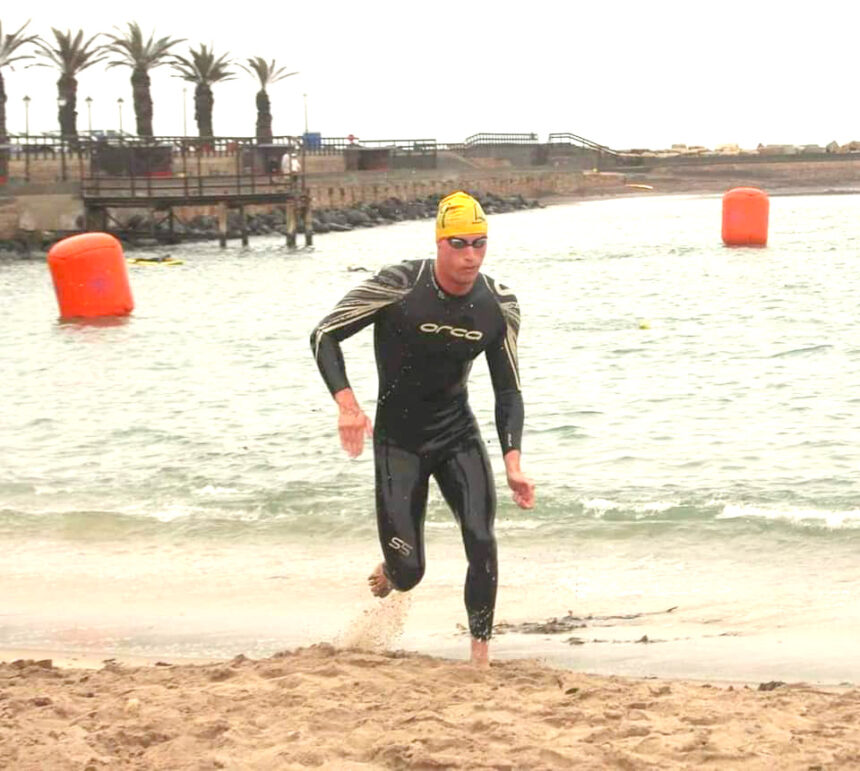Ahead of the much-anticipated 2024 Paris Olympics, New Era Sport sat down with swimmer Phillip Seidler, one of the few athletes who will represent Namibia at this year’s Olympics. He shared insights on his preparations and goals for this year’s competition.
You quit your full-time job after the Tokyo Olympics to focus on swimming, how much of a big decision it was and how has that impacted your life as an athlete/swimmer?
Last September, I made a big decision to quit my job and come out of sport retirement. I trained hard for just four months to qualify for the 10-kilometre race at the Olympic Games. Making such a quick comeback took real courage. Returning to professional sports wasn’t easy. I had used all my dad’s funds for the Tokyo 2021 Olympics, and after that, I retired to focus on supporting my family. But the Olympic committee believed in my talent and determination. They encouraged me to try again, and even helped with training expenses so I could focus on my dream without worrying about work.
Who is your biggest swimming inspiration, and why?
In Namibia, there are various people who inspire me, ranging from those in sports to business. Shaun Loubser and Torsten Gossow are my mentors who guide me in life. However, my biggest inspiration right now is my mom’s best friend, who is also my hero. She is currently facing health challenges, but remains one of the strongest people I know. She does good things in the world without expecting anything in return. She’s a fighter, and can overcome anything she sets her mind to.
You qualified for this year’s Olympics in February this year, after finishing as the first African at the Aquatic World Championship 2024 in Doha, Qatar. How are your preparations going? Can you describe a typical day of training for you?
My preparations for the Olympics are going well. I’ve expanded my team with more coaches. My mom and brother are my main trainers, along with Berry Shipper, who also helps with training, and Marina, my speed work coach from Russia. Conrad, my strength and conditioning coach, has adjusted my gym programmes and diet for the best performance.
Here’s what a typical day looks like for me: I wake up at 4h30 and start my first swim session at 5h00, which lasts until 07h00. Then, I stretch from 7h00 to 7h30. I work on my business until 01h00, then have my second swim session from 14h00 to 16h00. I stretch again from 16h00 to 16h30. From 16h30 to 18h30, I do my gym workout at BRG Biokinetics. I stretch once more from 18h30 to 19h00. After that, I relax and have some “me time.” If I can fit it into my work hours, I might also take a quick one and half hour to surf.
At Tokyo Olympics, you finished 16th with a time of 1:53:14. What specific goals have you set for yourself leading up to the Games?
Honestly, I am ranked last for this year’s Olympic Games in Paris. My goal is simple: to swim my heart out, give it everything I’ve got, and make Namibia proud with all the hard work I’ve put in. For Namibia, the biggest achievement isn’t always the medals, but the participation, showing that even athletes with limited resources can reach the pinnacle of sport, which is the Olympic Games.
How do you handle the pressure and expectations that come with preparing for the Olympics?
I luckily do not feel any pressure and expectations because I train my hardest and the best I can.
How do you analyse your opponents/competitors and develop race strategies?
This is where my dad plays a crucial role in my team. He is incredibly smart and precise when it comes to building strategies. For the Olympics, we have three strategies we’re working on, but I can’t reveal them.
My dad and I analyse our opponents by watching them, and by having me compete in many international races. This exposure helps us study the top athletes’ swimming paces, feeding strategies, and open water techniques. We then incorporate these insights into my training so I can keep up with the best in the world.
What are your long-term goals beyond the upcoming Olympics?
I want to leave a legacy behind that inspires not just swimmers, but all kinds of athletes in Namibia. My goal is to promote sports in Namibia and show fellow athletes that they don’t have to go to America or elsewhere to become successful. It can happen right here in our home country, with love and support from our Namibian community. I believe in the value of helping and supporting each other as athletes in Namibia, rather than bringing each other down. It’s essential to fight for what is right, not wrong. If I can make it to the Olympics as a Namibian, living and training in Swakopmund, with my mom as my coach, then anyone can achieve their dreams in Namibia.
What advice would you give to upcoming swimmers who dream of competing at the Olympics?
Always trust in yourself, even if others don’t. Set big, challenging goals and work hard and consistently to achieve them. When you reach a milestone, stay humble, and keep aiming for even greater goals. With hard work, you can accomplish anything you set your mind to. The journey to success is long, and you’ll face many obstacles. Don’t let them discourage you; let them motivate you to keep pushing forward. The path to success might feel lonely, but the rewards are worth it.



